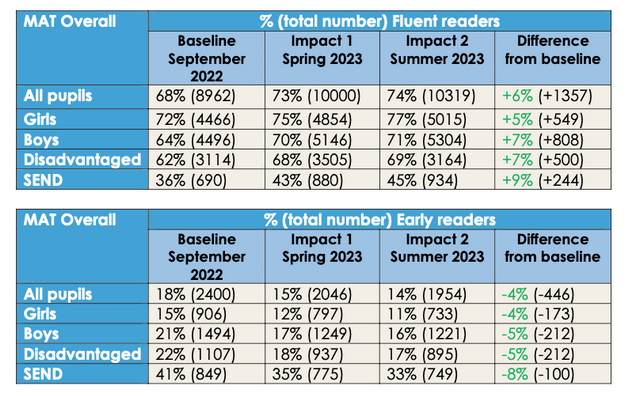
The Child Poverty Action Group states that “4.3 million children (30% of all UK children) were in poverty” in 2022/23, “up from 3.6 million in 2010/11”. Children from disadvantaged backgrounds often face additional challenges when it comes to reading and literacy. While policy initiatives aim to bridge the gap, schools play a crucial role in supporting these students. In this article, we will look at why socio-economic status (SES) impacts reading and five ways schools can help.
Why Does Socio-Economic Status (SES) Impact Reading?
The relationship between SES and reading ability is complex and influenced by various factors. Children from disadvantaged backgrounds often encounter obstacles that their more affluent peers do not, which can hinder their literacy development from an early age.
Limited Access to Books and Educational Resources
In many low-income households, there may be a lack of books and educational materials. Children might not have access to age-appropriate reading materials at home, limiting their exposure to language and vocabulary development outside of school. This early exposure is critical for building foundational reading skills.
Early Vocabulary Gap
Children from disadvantaged backgrounds often start school with a smaller vocabulary compared to their peers. The Education Endowment Foundation found the disadvantage gap for year 2 pupils in spring 2022 was around six months’ progress for reading. This "reading gap" can make it challenging to comprehend reading materials appropriate for their age, leading to difficulties in keeping up with the curriculum and affecting their confidence in learning.
Stressful Home Environments
According to the Michigan Journal of Economics, children from lower SES backgrounds often face instability, such as fluctuating income levels, which directly impacts their cognitive abilities, including reading. Financial instability can create stressful home environments. Issues such as overcrowding, inadequate housing conditions, and food insecurity can impact a child's ability to focus on learning. Chronic stress can affect cognitive development and concentration, making it harder for children to engage with reading tasks.
Nutrition and Concentration
Magic Breakfast has found that four million children are at risk of going hungry each morning. That's 25% of all children in the UK. Hunger and poor nutrition are prevalent issues among children living in poverty. A lack of proper nutrition can lead to difficulties in concentration and lower energy levels, negatively impacting learning, including reading development. Starting the day hungry can make it much harder for a child to focus at school.
Parental Involvement and Literacy Levels
Parental support is crucial in a child's literacy development. However, parents in disadvantaged situations may have lower literacy levels themselves or may be unable to dedicate time to reading activities due to work commitments or other stresses. This lack of support can hinder a child's progress in reading.
5 Ways Schools Can Help Children from Disadvantaged Backgrounds Who Struggle with Reading
- Provide Breakfast to Boost Concentration and Learning
- Create Safe and Supportive Learning Spaces
- Use Tailored Literacy Interventions
- Engage Parents and Caregivers in Literacy Development
- Address Mental Health and Wellbeing
Regular breakfast provision has been linked to better attendance and fewer behavioural issues. Schools can set up breakfast clubs or participate in programmess like Magic Breakfast, which provide free, healthy breakfasts to students. This not only addresses hunger but also helps improve attendance and academic performance, particularly in reading.
Recent government guidance regarding the 'Breakfast early adopters scheme' can be found here. According to the government site, 'The scheme will seek to test and learn what works ahead of national rollout.'
The government form to register your interest in the breakfast early adopters scheme is here.
Schools can offer a stable and nurturing environment that may be lacking at home. By providing quiet reading areas, structured literacy activities, and after-school support, schools can help children focus on learning. Training staff to recognise and support students dealing with stress can also make the school environment more conducive to learning.
Implementing personalised reading programmes can address the specific needs of struggling readers. Tailored interventions, such as one-on-one or small group models, can allow children to progress at their own pace. An individualised approach can help close the literacy gap and build confidence in reading.
Schools can encourage parental involvement by providing resources and workshops that equip and encourage parents to support their child's reading at home. Even simple strategies like sending home books or reading logs can foster a home environment that values literacy, even if parents have limited time or resources.
Offering mental health support can help students manage stress and emotional challenges that interfere with learning. Schools can provide counselling services, mindfulness programmes, or peer support groups. Addressing mental wellbeing can improve focus and engagement in reading activities.
Organisations like Place2Be have a good reputation of supporting the mental health of pupils in schools. They work with many schools across the country and have been doing so for over 25 years. Consider providing a service like this to augment the work your staff are doing.
Leveraging Literacy Programmes to Support Students
While schools implement various strategies to support students, incorporating effective literacy programmes, such as ReadingWise, can make a significant difference. Programmes that have evidence that they improve reading among disadvantaged students can provide structured and engaging ways to improve reading.
Government-Funded RCT in Disadvantaged Area
The UK government, through the DfE, trialled ReadingWise in one of the most disadvantaged areas of the country. The study was a randomised controlled trial, and included 17 schools. The statistically significant results demonstrated that the ReadingWise programme improved reading almost twice as fast as usual lessons.
You can read more about this study here.
Impact on Pupil Premium Pupils in a Multi-academy Trust
ReadingWise works with many multi-academy trusts. A key focus is improving reading for disadvantaged pupils, usually measured by free school meals (FSM) or pupil premium grant status.The impact on disadvantaged grouops tends to be very strong, as illustrated by the data below where 500 more disadvantaged pupils became fluent readers. You can read more about this on our multi-academy trust page.

ReadingWise Helps to Improve Outcomes for Disadvatnaged Children
By offering targeted literacy modules, ReadingWise helps students improve their reading skills through tailored interventions. Schools and government studies show consistent, positive outcomes. Schools note that the programme is cost-effective and has a measurable impact in a short amount of time.
SES significantly can impact a child's reading ability due to a combination of complex factors, including limited resources, early vocabulary gaps, stressful home environments, nutritional challenges, and reduced parental involvement. However, schools have the some power to help mitigate these challenges through targeted strategies and support systems.
Every child deserves the opportunity to develop strong literacy skills, and with concerted effort and the right resources, schools can make a lasting difference in the lives of children from disadvantaged backgrounds.
Boost Your School’s Literacy Results
Over 300,000 pupils in UK schools have completed a ReadingWise programme! We hope to help you and your children too.
We highly recommend you spend 20 minutes running through the programme with our friendly and knowledgeable team by booking a demo to suit your diary.
Find out more about our:
Photo by Sharath Kumar Hari on Unsplash









